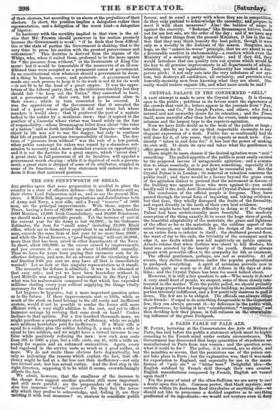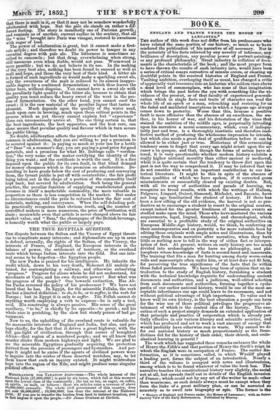A PARIS FABLE OF P A TX ALE.
M. PATEN, lecturing at the Conservatoire des Arts et Metiers of Paris, has laid before the public a statement which must be highly consoling to the French mind under certain circumstances. The Government has discovered that large .quantities of strychnine are manufactured in Paris from nun vonnea ; and the question arose, what it could be for ? The police, it is averred, are so strict, and the penalties so severe, that the pernicious use of the poison can- not take place in Paris ; but the explanation was, that it was made for exportation to England, and especially for use in the manu- facture of " pale ale or " bitter beer." Delightful idea—the English subdued by French skill through their own avarice ! English manufactures conquered by French, English art turned upon itself !
For the peace of mind of the ultra-Gallican we are sorry to cast a doubt upon this tale. Common porter, that black mystery, may contain within its darksome flood strychnine or anything else—we should not like to pronounce a decided negative as to anything predicated of its ingredients—we would not venture even to deny
that there is malt in it, or that it may not be somehow wonderfully adulterated with hops. But the pale ale stands on rather a dif- ferent footing. The story is manifestly one of Parisian growth ; and reminds us of another, current earlier in the century, that all the " wine " brought into Paris was vinegar, restored to sweetness with sugar of lead.
The power of adulteration is great, but it -cannot make a first- rate article ; and therefore we doubt its power to tamper in any essential degree with pale ale. The bitterness is sometimes as- cribed to camomile ; but that drug, overwhelming when strong, still nauseous even when feeble, would not pass. Wormwood is more possible ; but we do not believe in its use. In the making of the very best ales, nothing has been found to succeed so well as malt and hops, and those the very best of their kind. A bitter ale is formed of such ingredients as would make a sparkling sweet ale, only the sweetness of the malt is reduced to its almost inappre- ciable degree by a continued fermentation; which thus leaves the bitter bare, without disguise. You cannot have a sweet ale with thepeculiarly light quality of the bitter ale, because to obtain that quality you must reduce the heavy sweet of the wort in the pro- cess of fermentation. On the other hand, you cannot omit the sweet ; it is the raw material Of the peculiar liquor that tastes so pleasant. Much depends upon the quality of the water used, much upon care in brewing, numb upon those critical points in the process which as yet theory cannot explain but " experience" alone can unconsciously arrive at. The one thing certain is, that the best ingredients, the best apparatus, and the best care, can alone secure that peculiar quality and flavour which in turn secure the public liking.
No doubt, adulteration affects the price even of the best beer. So common is adulteration, that you are willing to pay a premium to be secured against it : in paying so much at your inn for a bottle of " Bass " on a summer's day, you are paying a good price for good materials, and a premium for what Mr. Babbage calls "verifica- tion," the very name of the maker certifying the identity of the thing you want ; and the certificate is worth the cost. It is a fine imposed upon the public for its own fault, in that blind demand for money cheapness which is the premium on adulteration. De- manding to have goods below the cost of producing and conveying them, the tyrant public is put off with counterfeits ; the fair profit i being taken out in the shape of a portion of the commodity itself kept back, but covered by adulteration. Such being the general practice, the peculiar function of supplying unadulterated goods becomes in itself a marketable commodity, the more valuable in proportion as there is less competition in the market. But under no circumstances could the price be reduced below the fair cost of materials, making, and conveyance. When the self-deluding pub- lic practically recognizes that obvious truth, anIthe number of accredited makers is more numerous, the price of 'verification will abate ; meanwhile even that article is never charged above its fair market value, and " Bass," the champagne of the British beverage, is honestly worth what the public so largely pays.



























 Previous page
Previous page